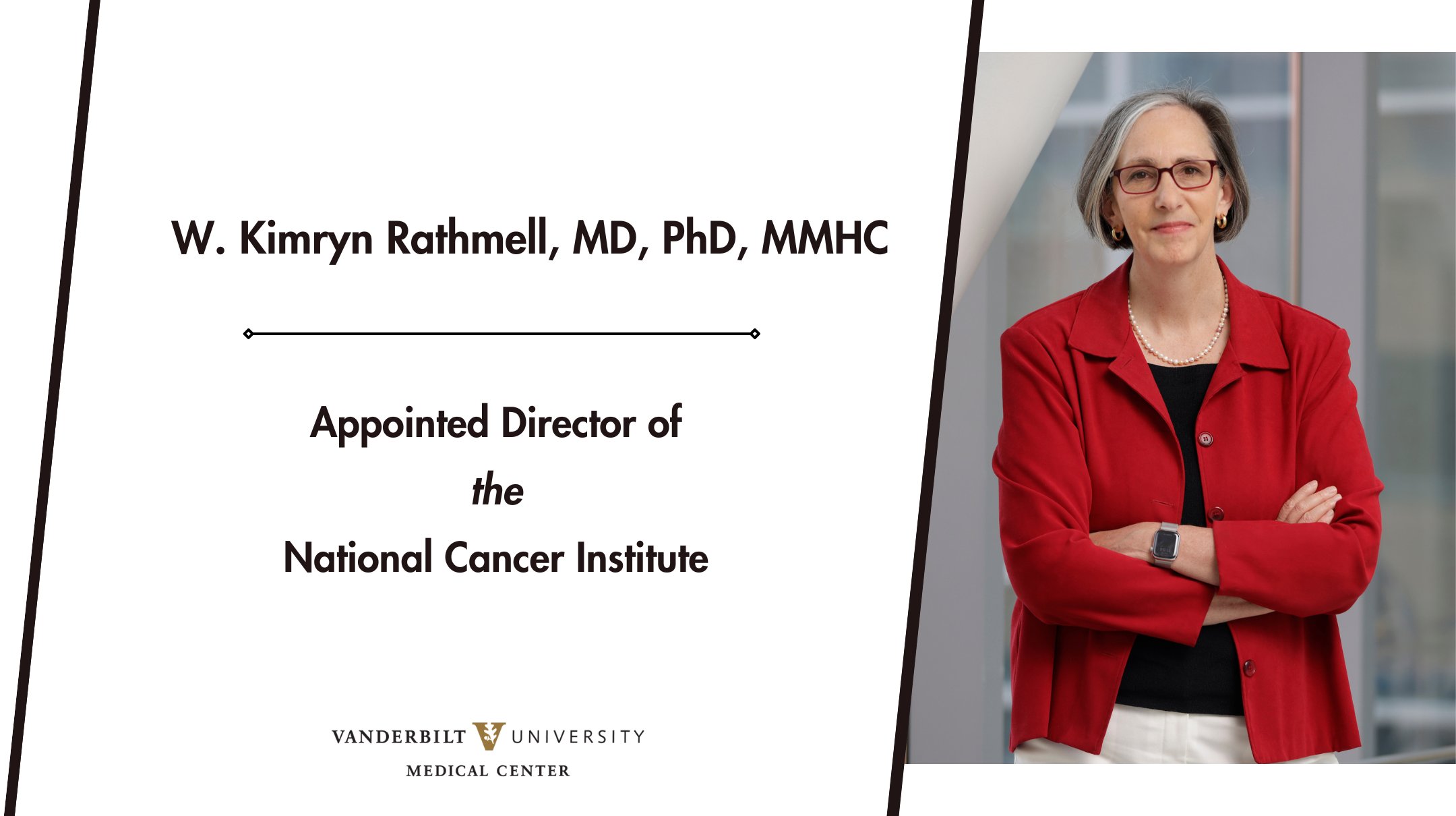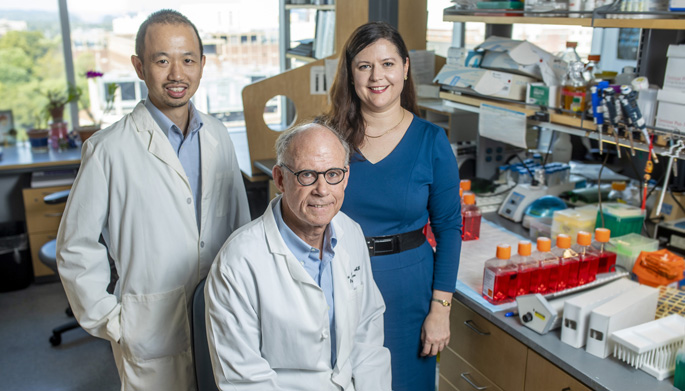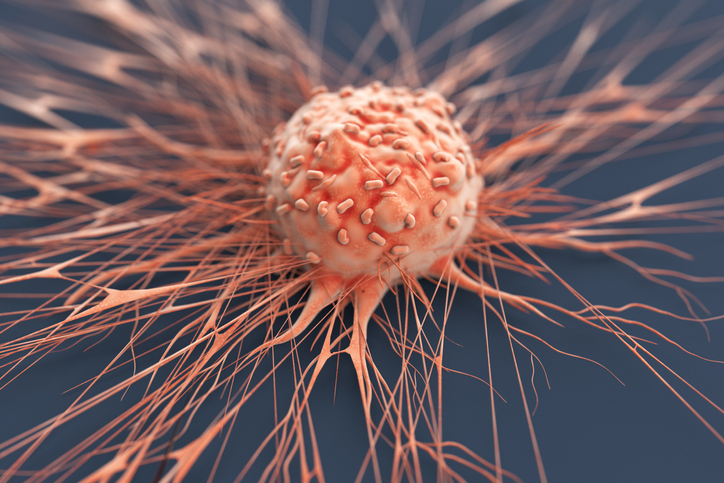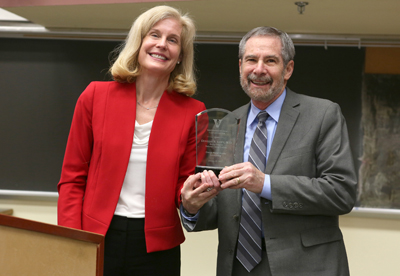National Cancer Institute
-

Vanderbilt professor, physician Dr. W. Kimryn Rathmell to be appointed director of the National Cancer Institute
Kimryn Rathmell, MD, PhD, MMHC, Hugh Jackson Professor of Medicine and chair of the Department of Medicine at Vanderbilt University Medical Center, will be appointed director of the National Cancer Institute. Through this upcoming appointment, Rathmell will become the NCI’s 17th director and only the second woman to hold this position leading the nation’s fight against cancer. She was chosen to serve in this role by President Biden. Read MoreNov 20, 2023
-

Vanderbilt’s Dr. W. Kimryn Rathmell to be appointed director of the National Cancer Institute
Kimryn Rathmell, MD, PhD, MMHC, the Hugh Jackson Professor of Medicine and chair of the Department of Medicine at Vanderbilt University Medical Center, will be appointed Director of the National Cancer Institute. Read MoreNov 17, 2023
-

Holowatyj receives National Cancer Institute MERIT Award
Vanderbilt's Andreana Holowatyj, PhD, MSCI, has received the National Cancer Institute’s Method to Extend Research in Time Award to support her ongoing investigation into how early-onset colorectal cancer and its treatments impact reproductive health. Read MoreJul 19, 2023
-

Colon cancer researchers awarded NCI grant for study of early lesions
Vanderbilt researchers are studying precancerous lesions and early cancers in the colon, with the goal of developing new ways to prevent colorectal cancer, the nation’s second leading cancer killer. Read MoreSep 22, 2022
-

Vanderbilt engineering professor to use $3 million grant to develop technology to help cancer patients better fight disease
John Wilson, associate professor of chemical and biomolecular engineering at Vanderbilt University, has received a $3 million grant from the National Cancer Institute to develop technology that seeks to boost a person’s immune system to better fight cancer. Wilson is the Principal Investigator of the five-year grant. He specializes in the study of cancer immunotherapy... Read MoreSep 6, 2022
-

Research Snapshot: Collaborative research lays groundwork for potential treatment of a rare and deadly type of cancer
A collaborative project between William Tansey and Stephen Fesik has laid the foundation for pre-clinical and clinical trials for rare childhood tumors that are diagnosed in 25 children per year in the United States. Read MoreApr 22, 2022
-

Research Snapshot: Vanderbilt team discovers potential explanation for treatment resistance in skin cancer
Melanoma is the fifth most-common type of cancer in the U.S., and according to the American Cancer Society, about half of patients with malignant melanoma have mutations of the BRAF gene. Identification of potential tumor biomarkers such as SOX10 can help physicians better predict outcomes for their patients. Read MoreFeb 28, 2022
-

$1.9 million NIH project to investigate effects of shear stress on cancer cells
A biomedical engineering professor has received a $1.9 million NIH grant to investigate the effects of mechanical stimuli such as shear stress on the behavior of cancer cells in blood flow. J. Lawrence Wilson Professor Mike King and his research group will develop the devices for the study as well as new cell lines to... Read MoreSep 9, 2021
-

$1.9 million NIH project to investigate effects of shear stress on cancer cells
A biomedical engineering professor has received a $1.9 million NIH grant to investigate the effects of mechanical stimuli such as shear stress on the behavior of cancer cells in blood flow. J. Lawrence Wilson Professor Mike King and his research group will develop the devices for the study as well as new cell lines to... Read MoreSep 9, 2021
-

People at high genetic risk for colorectal cancer benefit more from lifestyle changes
People with a high polygenic risk score for colorectal cancer could benefit more at preventing the disease by leading healthy lifestyles than those at lower genetic risk, according to a study by Vanderbilt researchers published in the April issue of The American Journal of Clinical Nutrition. Read MoreMay 13, 2021
-

Cancer Institute grant funds new integrated approach to early lung cancer detection
Vanderbilt researchers have received a National Cancer Institute grant to develop a novel, integrative approach to detect early signs of lung cancer. The four-year project builds on a related, recent study that established the value of using three separate measures—structural imaging, a protein marker and information available from electronic health records—to predict lung cancer in... Read MoreJan 22, 2021
-

A potential new targeted therapy for metastatic melanoma
While 60 percent of people with metastatic melanoma, an aggressive type of skin cancer, have multiple treatment options available to them, roughly 40 percent either do not respond to treatment, or relapse. Read MoreAug 19, 2020
-

Yin receives early investigator MERIT Award from NCI
Zhijun Yin, PhD, assistant professor of Biomedical Informatics at Vanderbilt University Medical Center, has received the National Cancer Institute’s Method to Extend Research in Time Award (or MERIT Award) for Early Stage Investigators. Read MoreMay 14, 2020
-

Research team awarded $9 million to study extracellular RNA in colorectal cancer
A multidisciplinary team of investigators at Vanderbilt University and Vanderbilt University Medical Center has received a program project grant from the National Cancer Institute to explore extracellular RNA in colorectal cancer. Read MoreApr 15, 2020
-

Triple-negative breast cancer drug therapy shows promise
Researchers from Vanderbilt-Ingram Cancer Center (VICC) discovered a role for MYCN in triple-negative breast cancer (TNBC), a particularly aggressive form of the disease, and identified a potential intervention for further clinical investigation. Read MoreMar 12, 2020
-

Colorectal cancer researchers receive SPORE funding
Colorectal cancer researchers from Vanderbilt-Ingram Cancer Center (VICC) have been awarded a Specialized Program of Research Excellence grant from the National Cancer Institute (NCI). Read MoreAug 26, 2019
-

Grant strengthens breast cancer research efforts
Breast cancer researchers at Vanderbilt-Ingram Cancer Center have secured a fourth round of continuous Specialized Program of Research Excellence funding. Read MoreAug 22, 2019
-

Study finds higher death rates in poor neighborhoods
Living in an economically disadvantaged neighborhood is likely to lead to death at an earlier age, especially among African-Americans, new research shows. The death rate is even more pronounced among disadvantaged individuals with unhealthy lifestyle habits. Read MoreJan 18, 2018
-

Coffey lands major NCI award to support colorectal cancer research
Vanderbilt’s Robert Coffey Jr., M.D., has received an Outstanding Investigator Award from the National Cancer Institute (NCI) — more than $6.6 million over seven years — to support studies aimed at advancing the diagnosis and treatment of colorectal cancer (CRC), a leading cancer killer. Read MoreJun 8, 2017
-

National Cancer Institute’s Lowy details HPV virus research efforts
Douglas Lowy, M.D., acting director of the National Cancer Institute (NCI), warned that worldwide death rates from cervical cancer are expected to increase in low- and middle-income countries during the next 15 years unless steps are taken to prevent the cancer from occurring. Almost all cases of cervical cancer are linked to a viral infection. Read MoreFeb 2, 2017